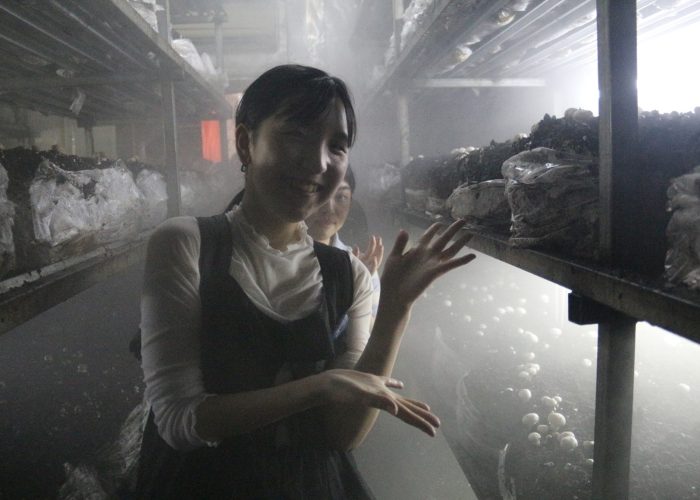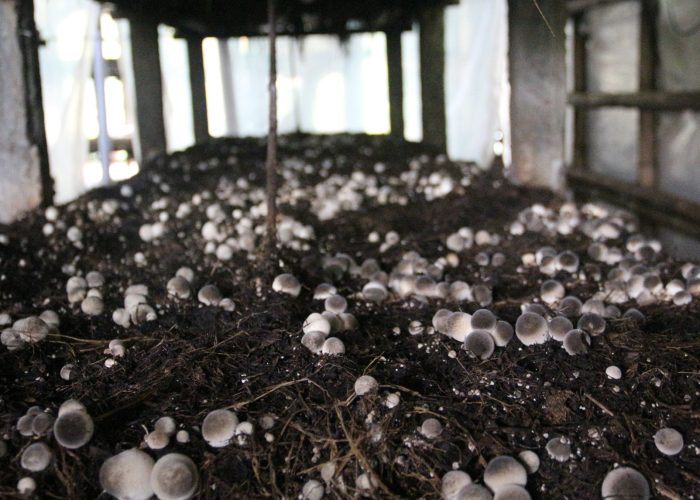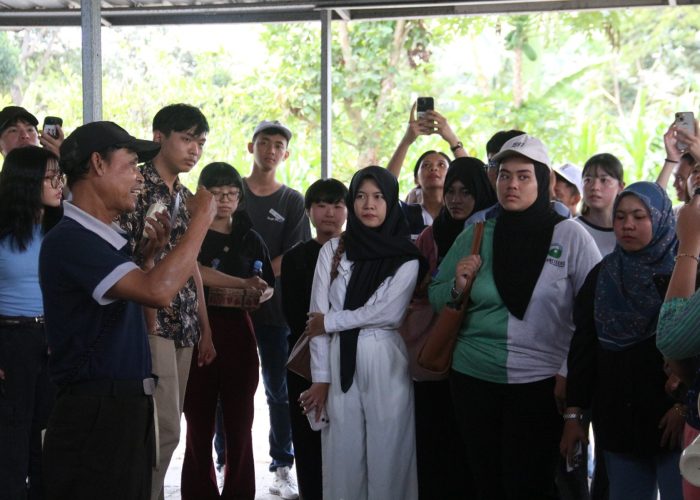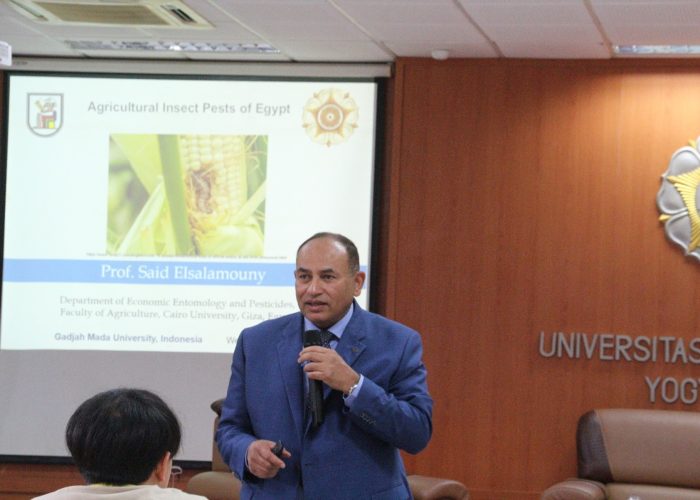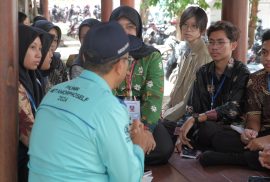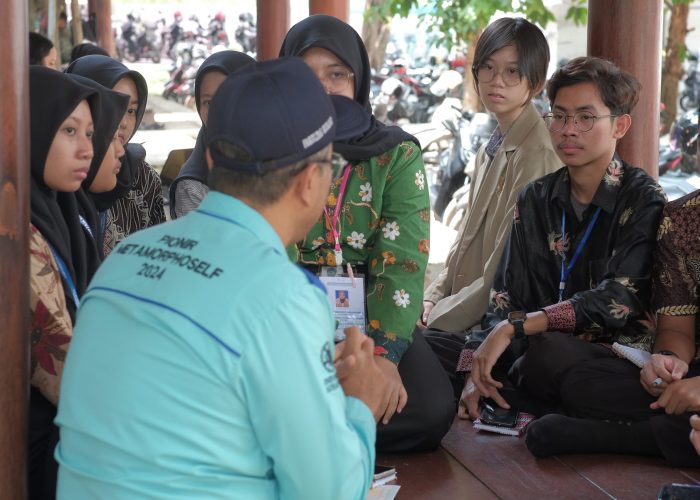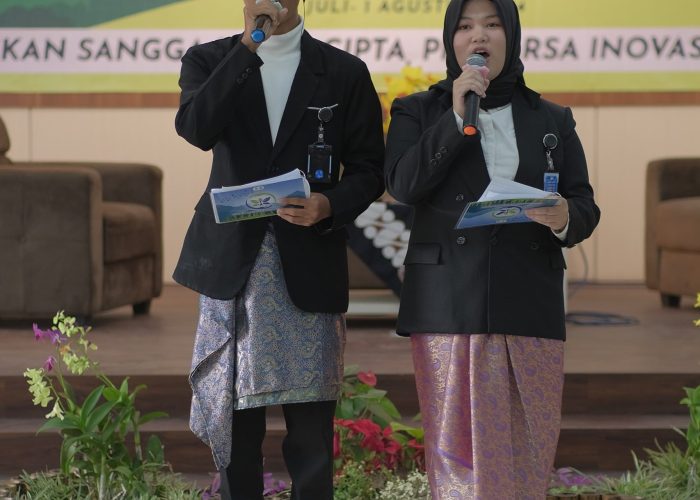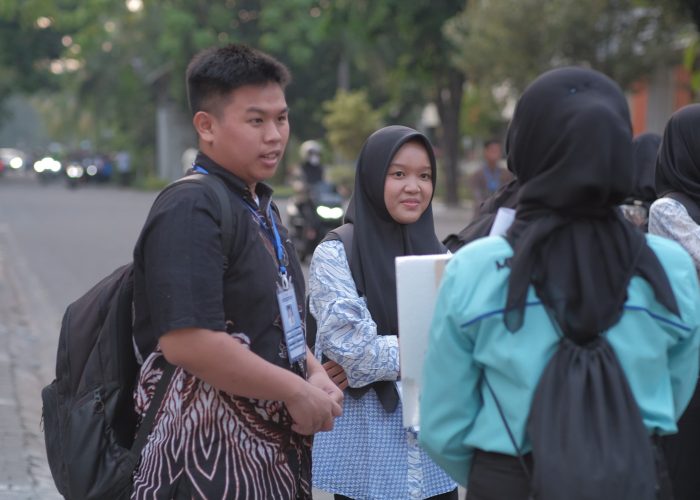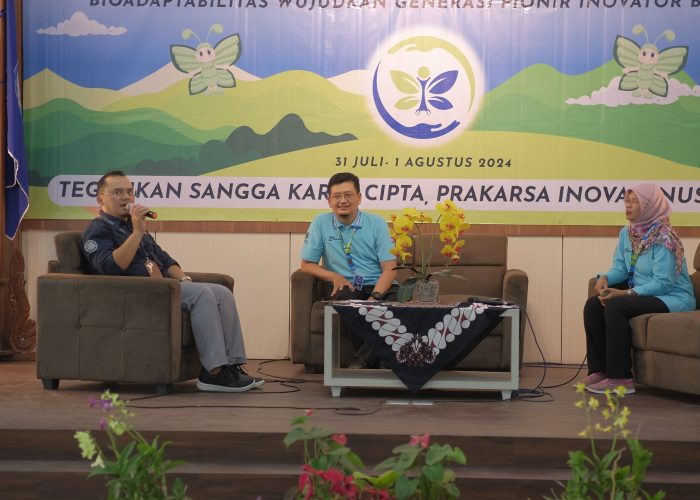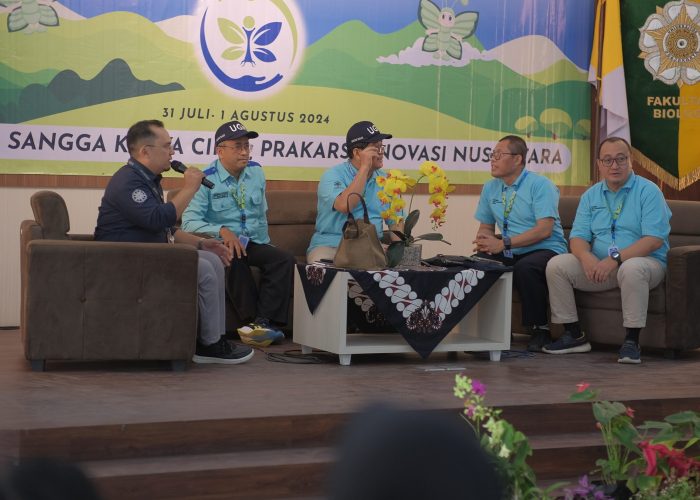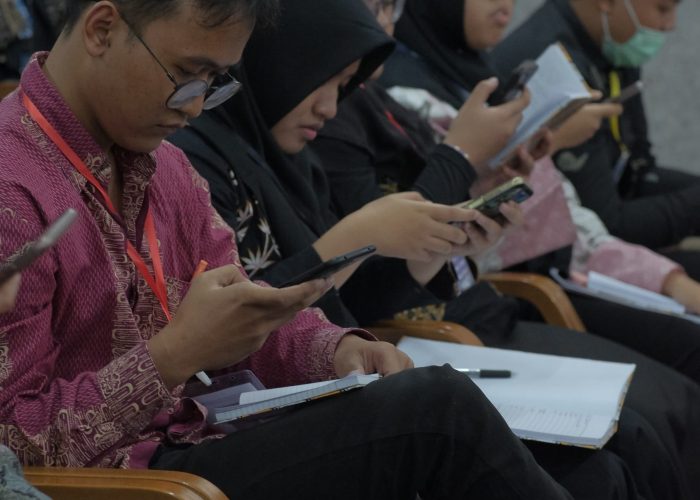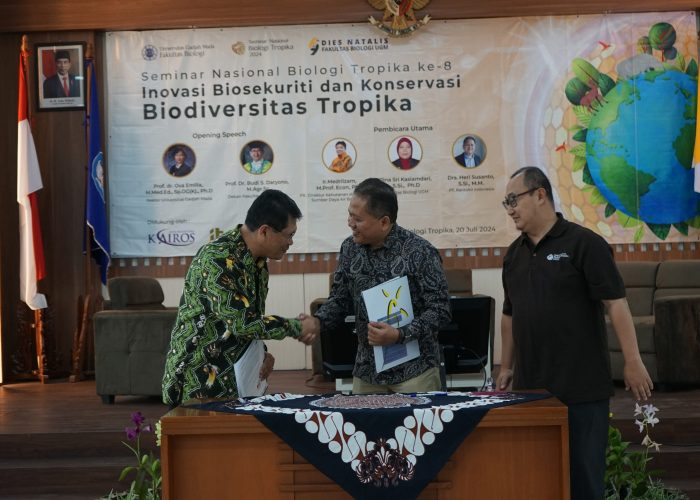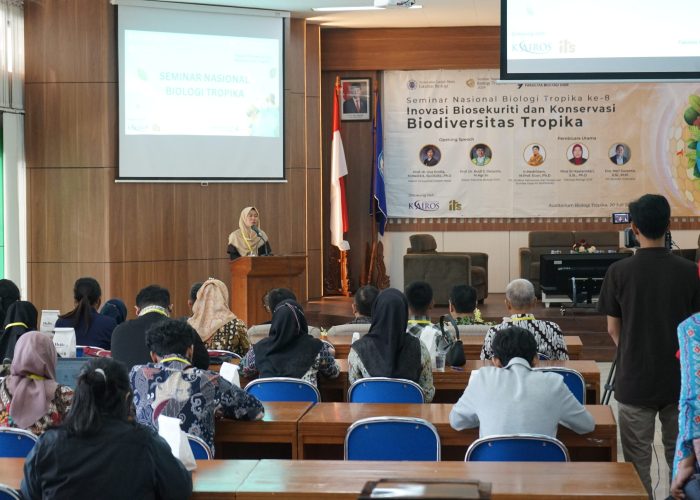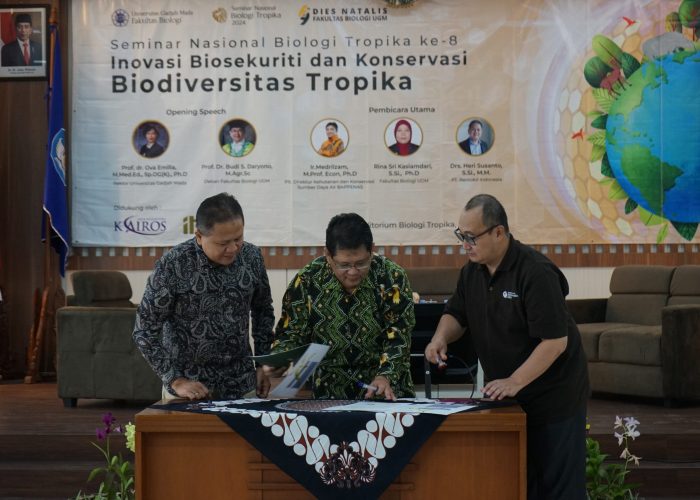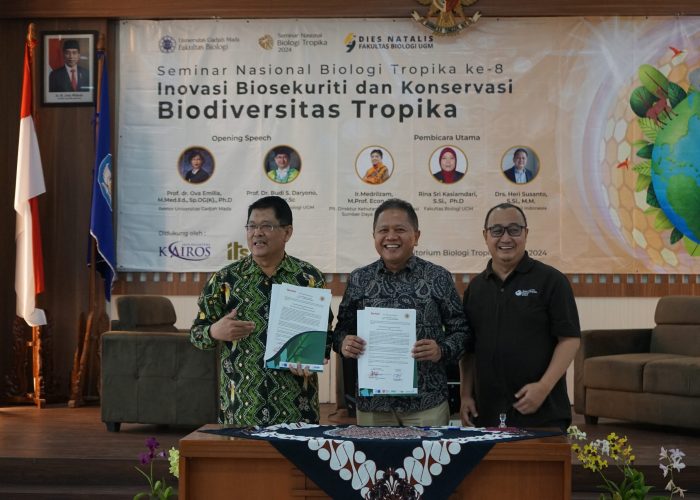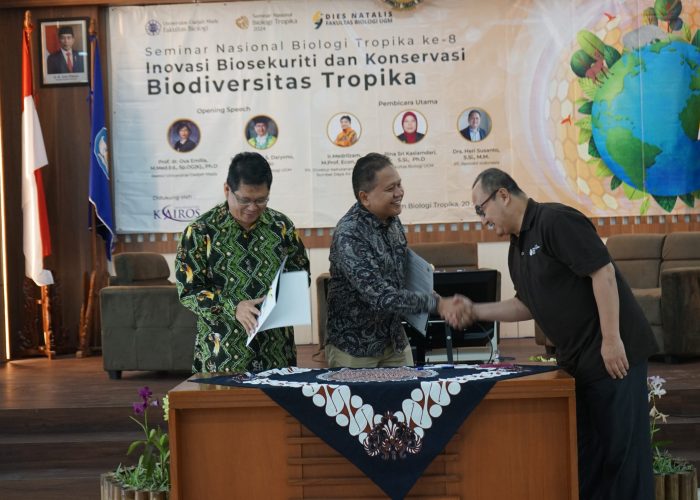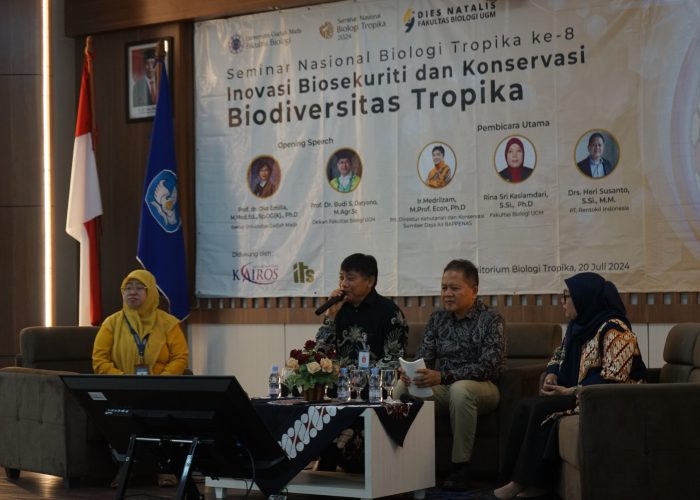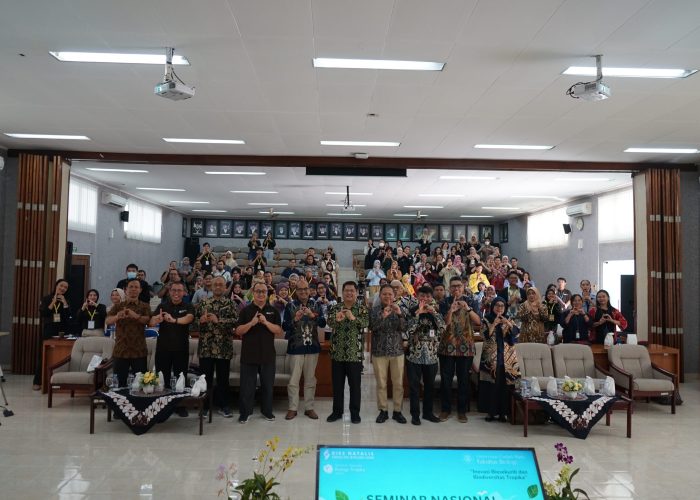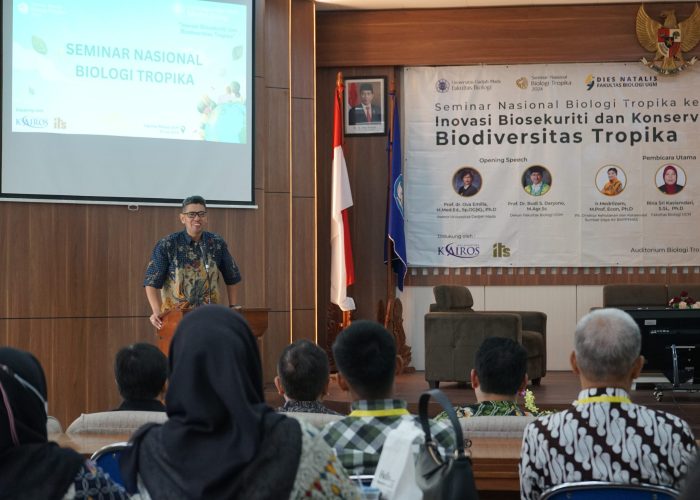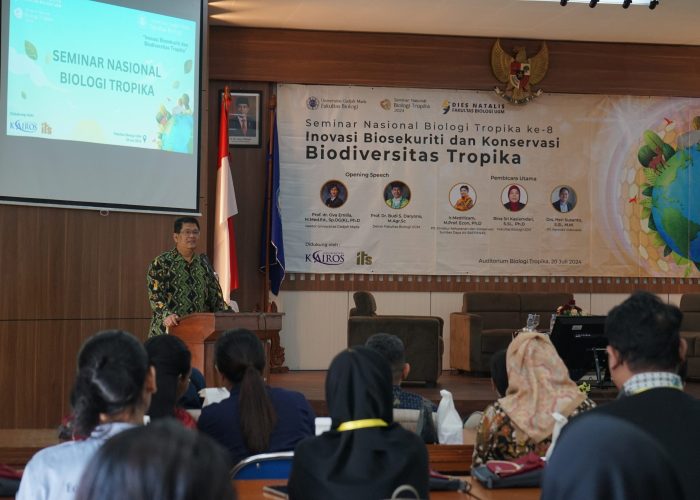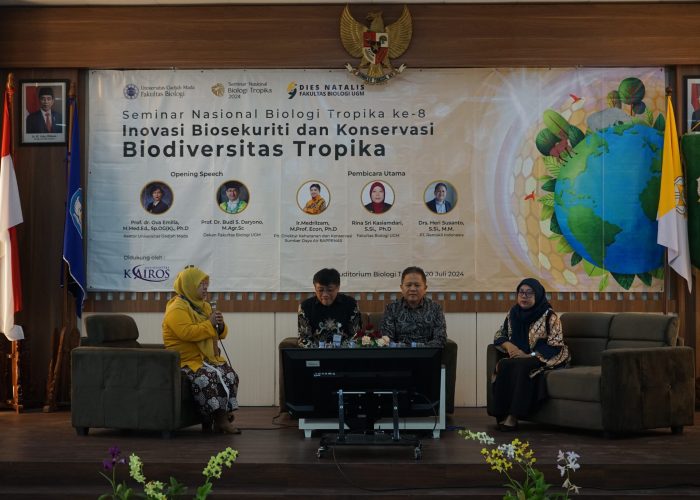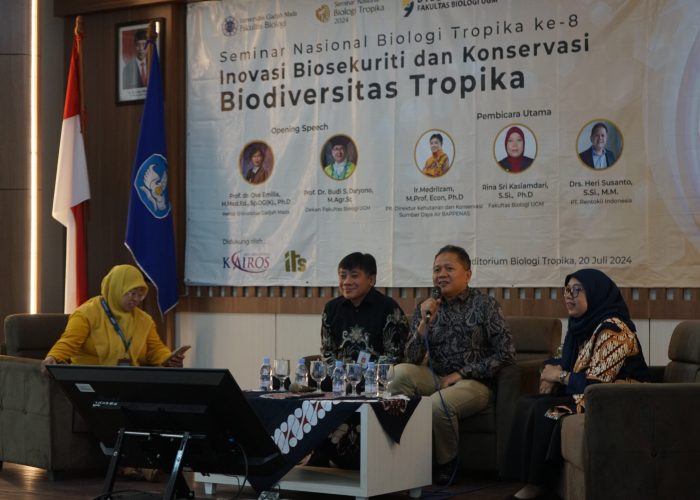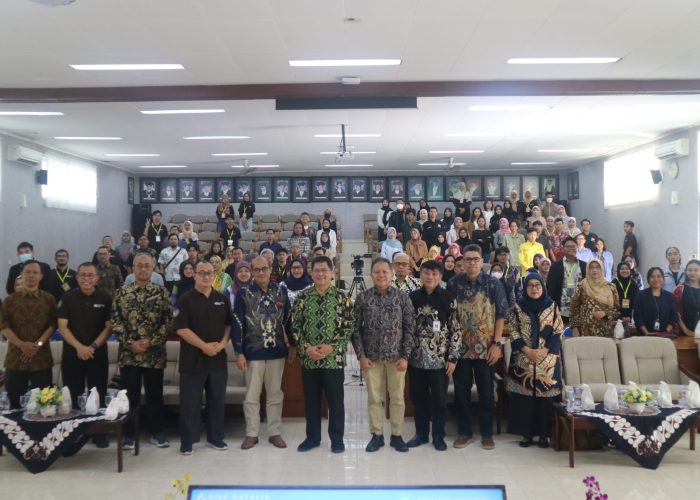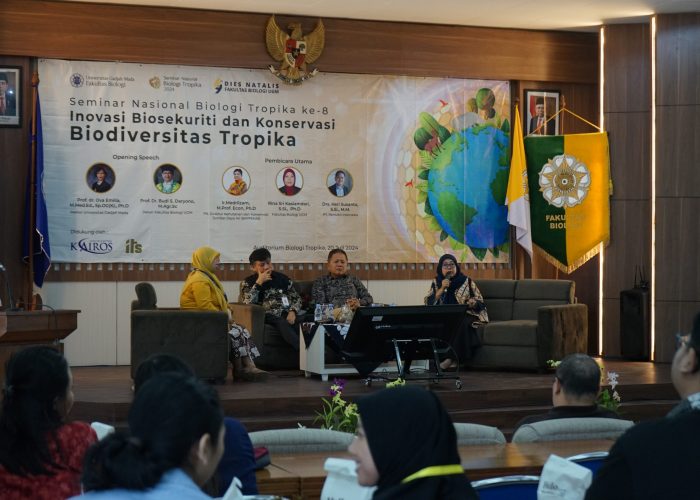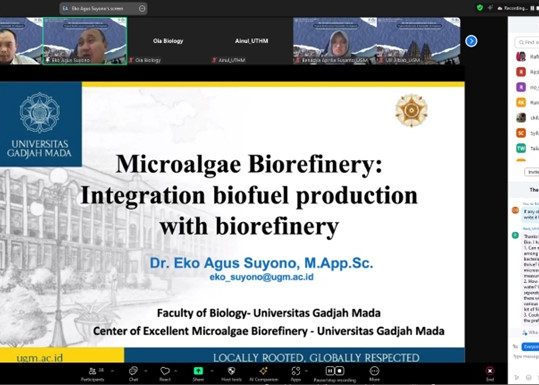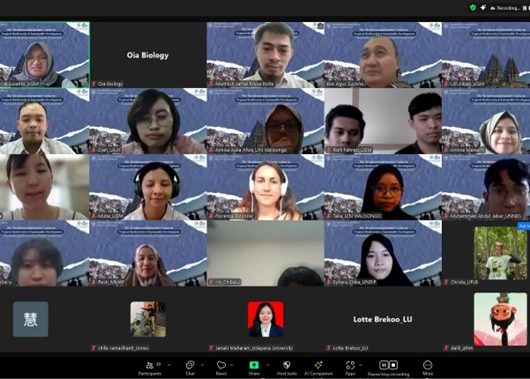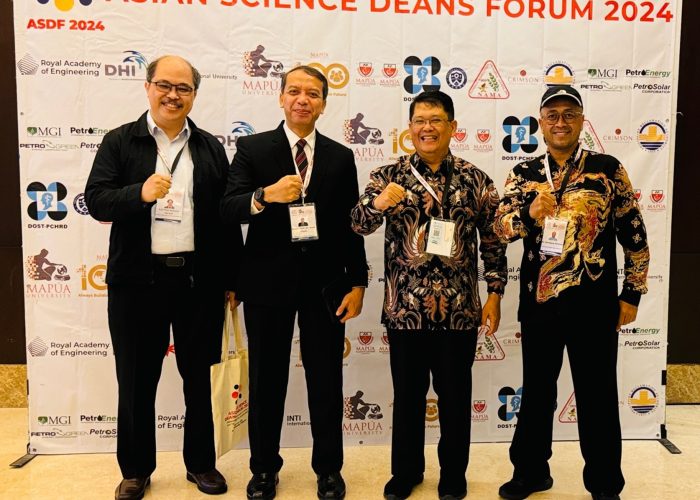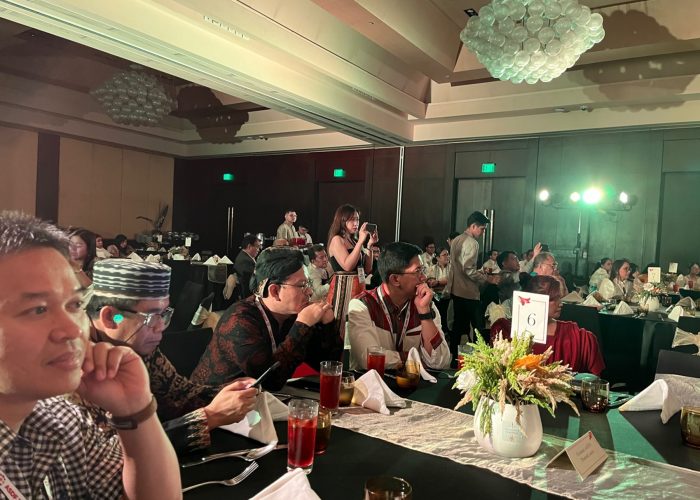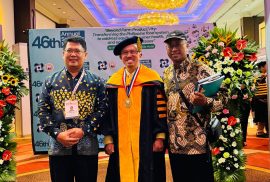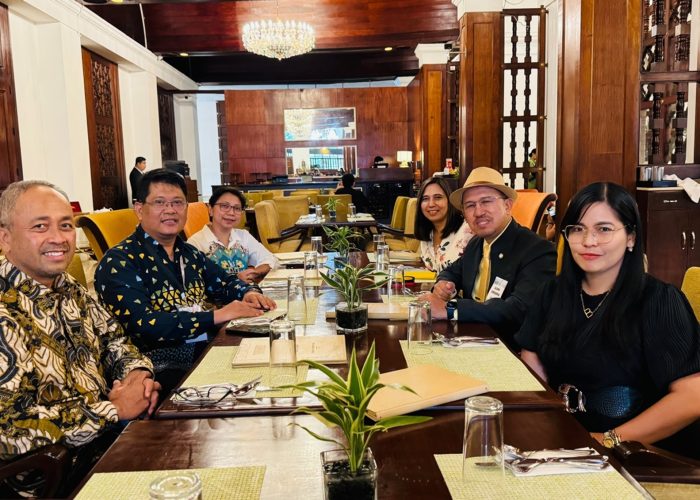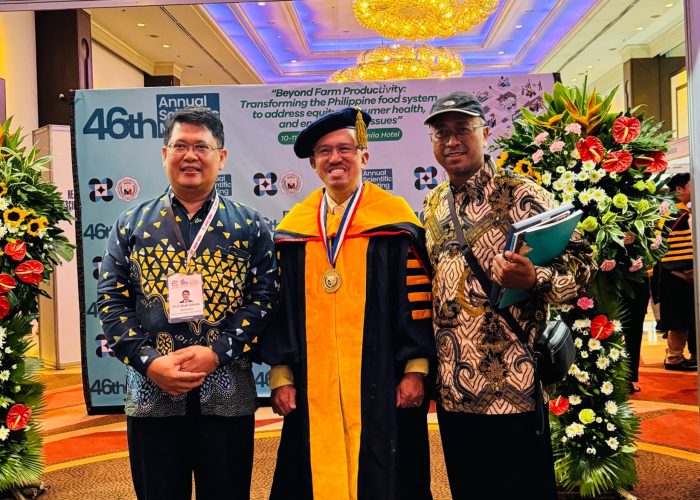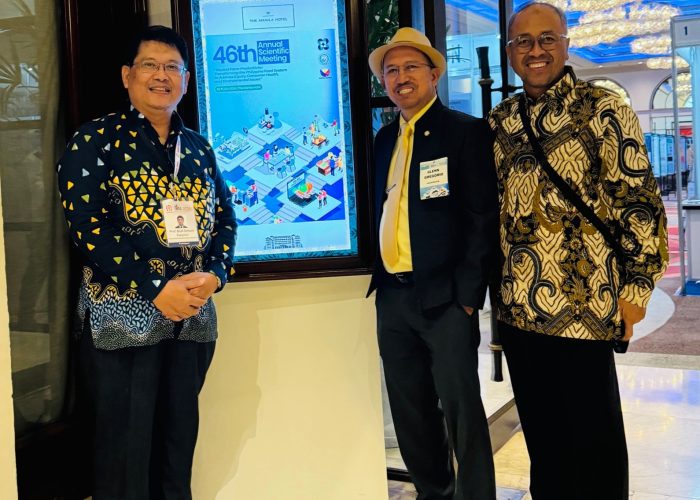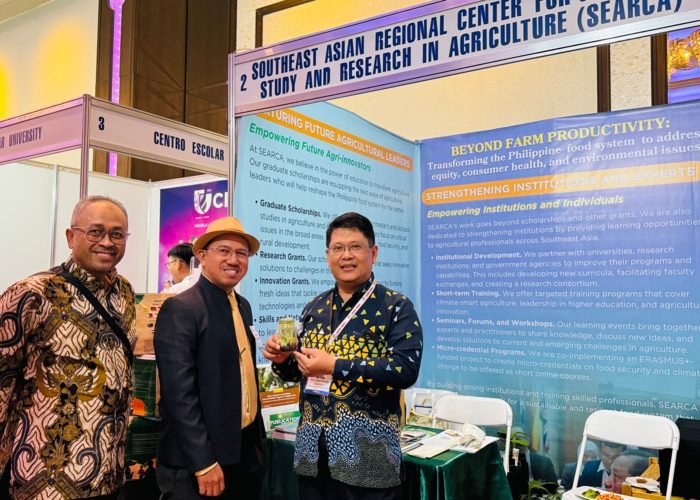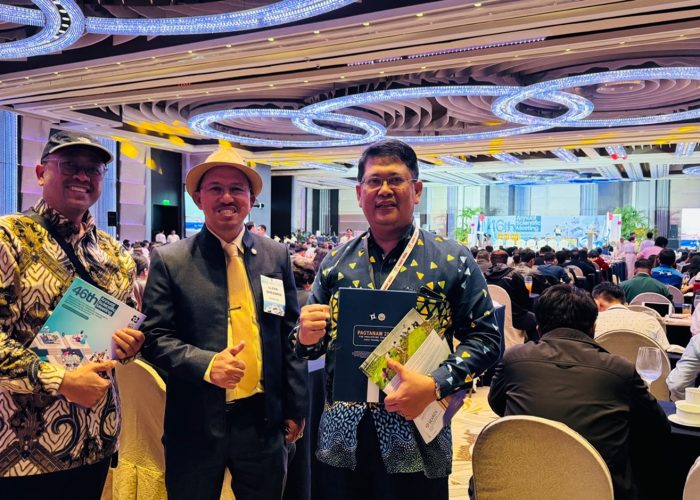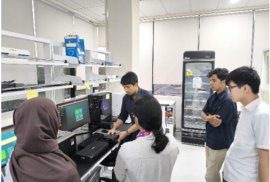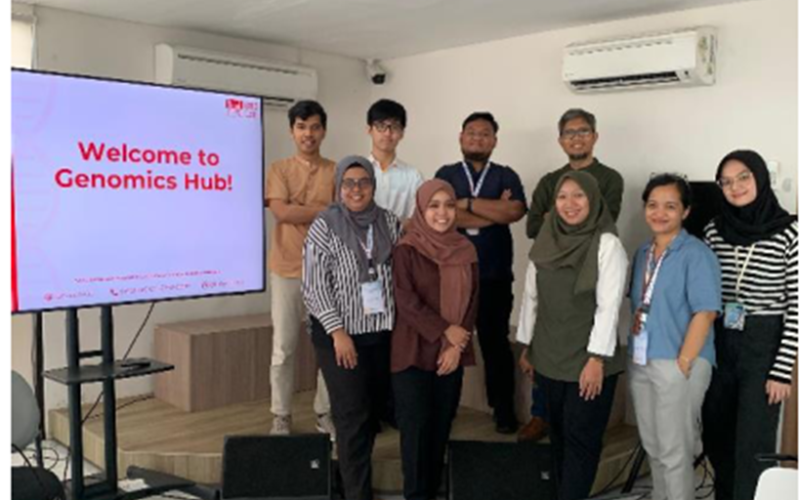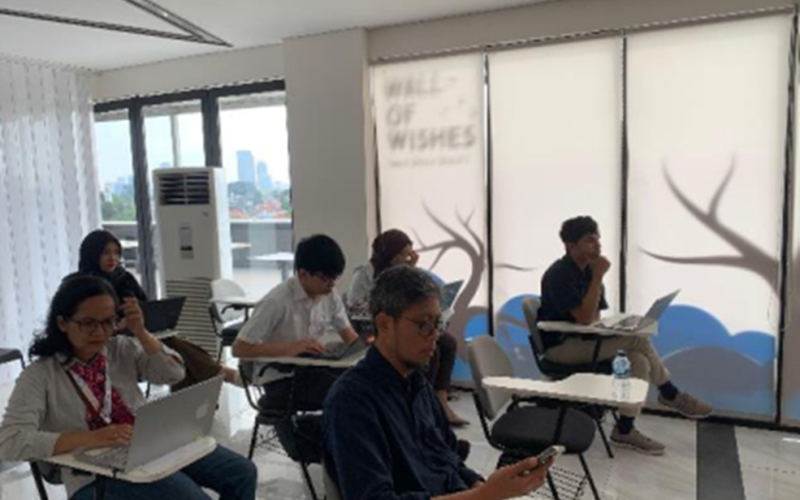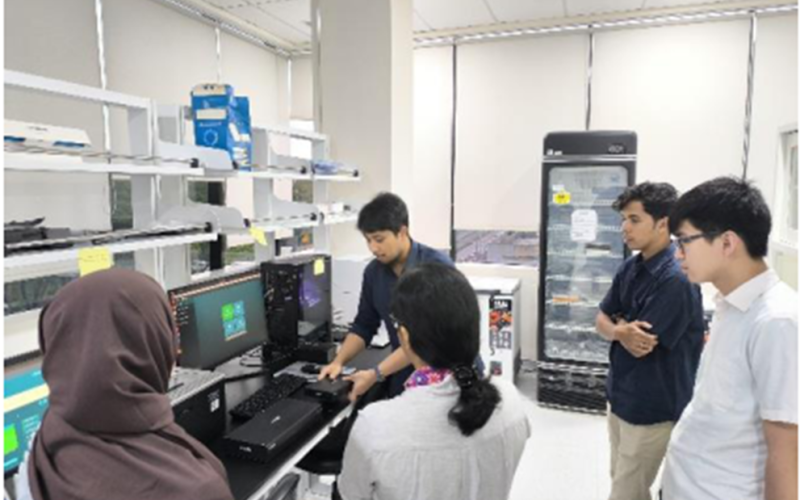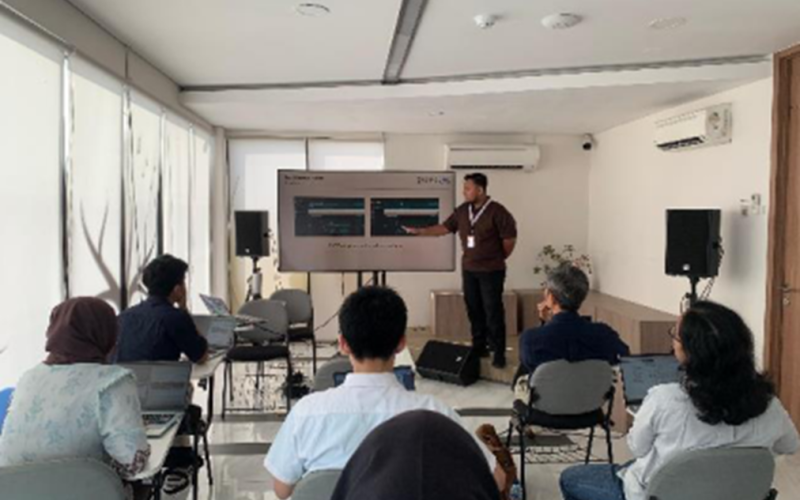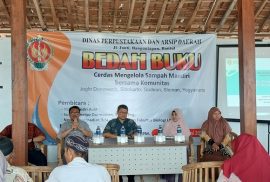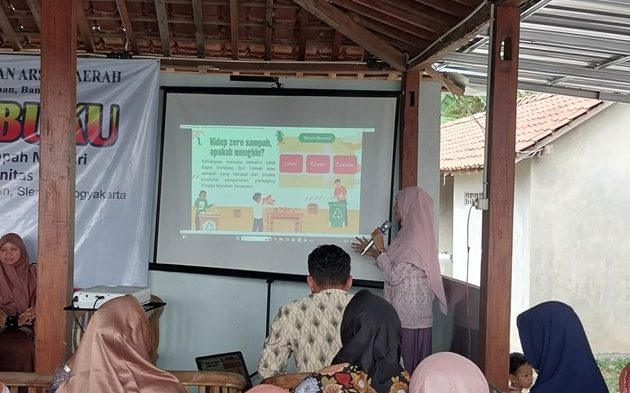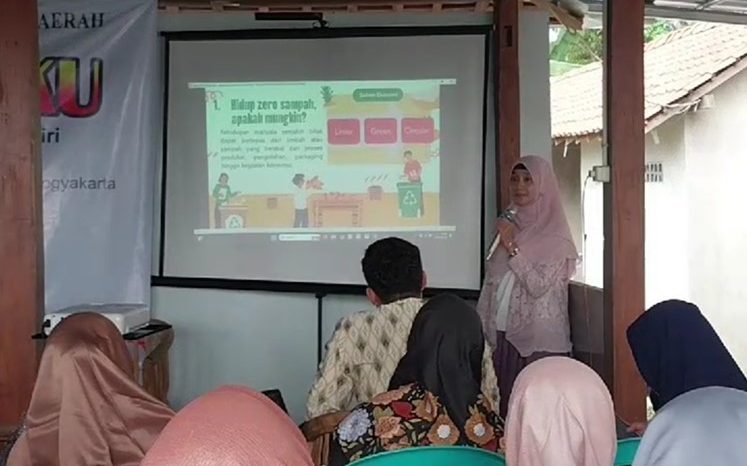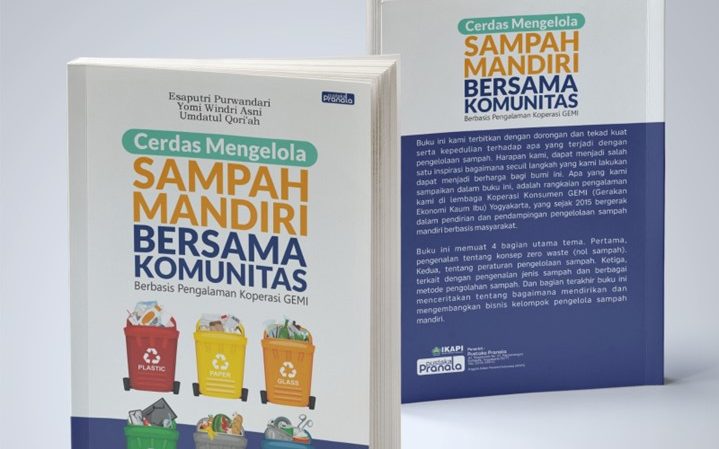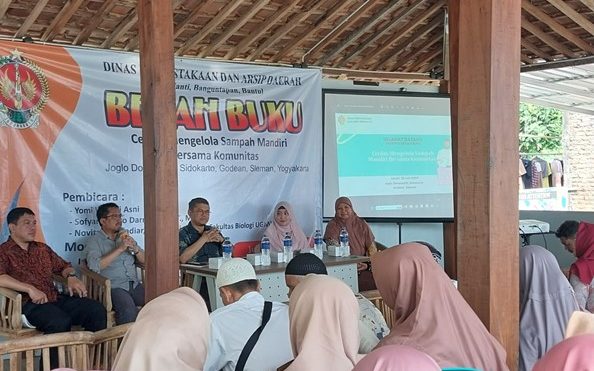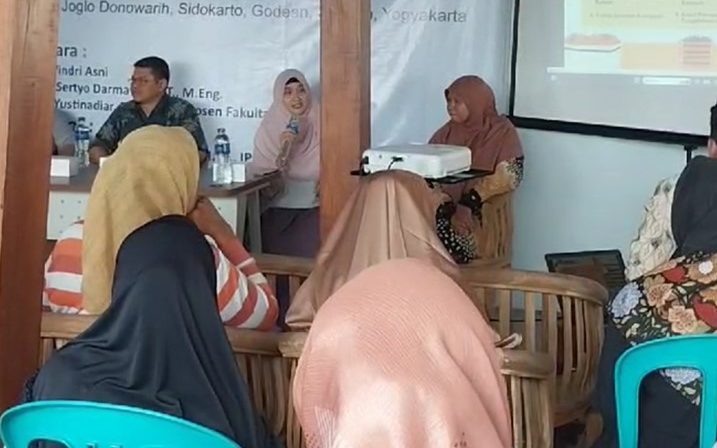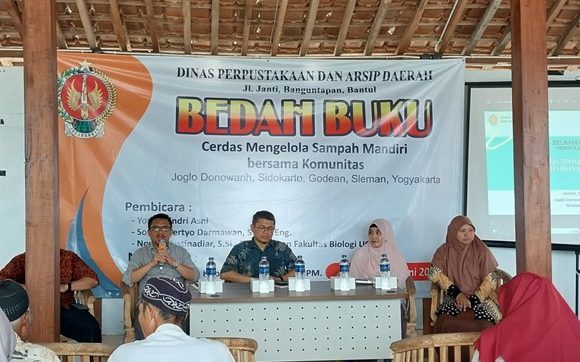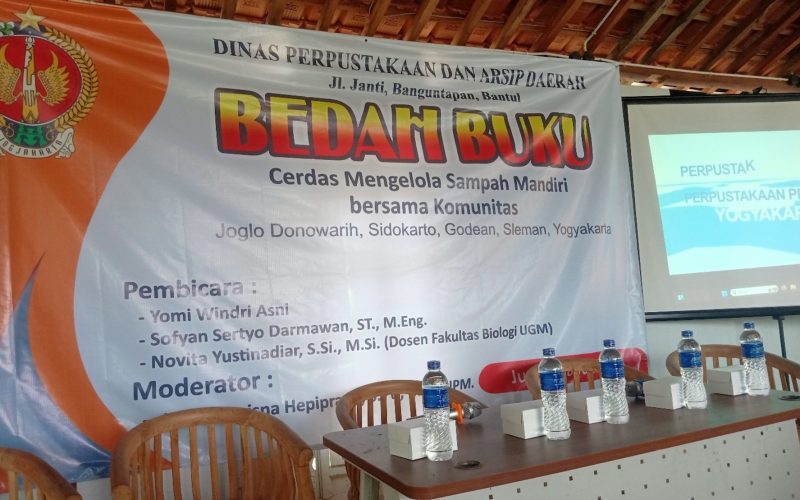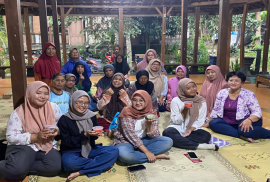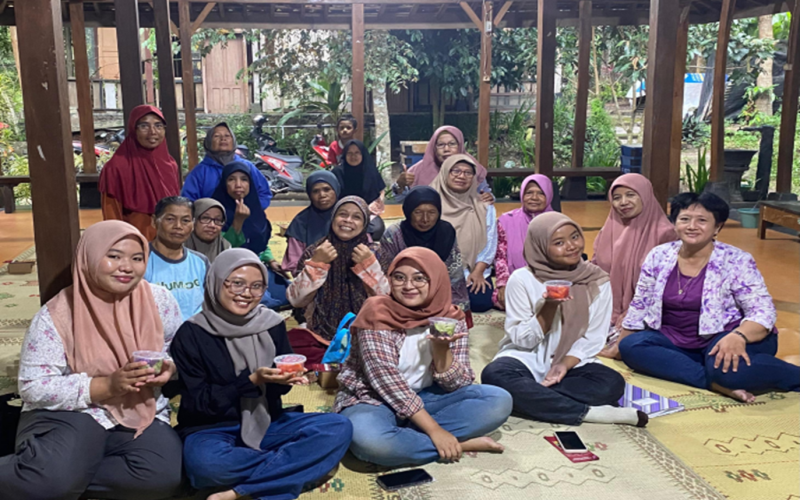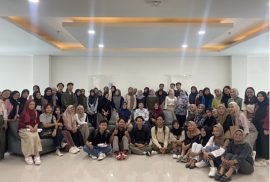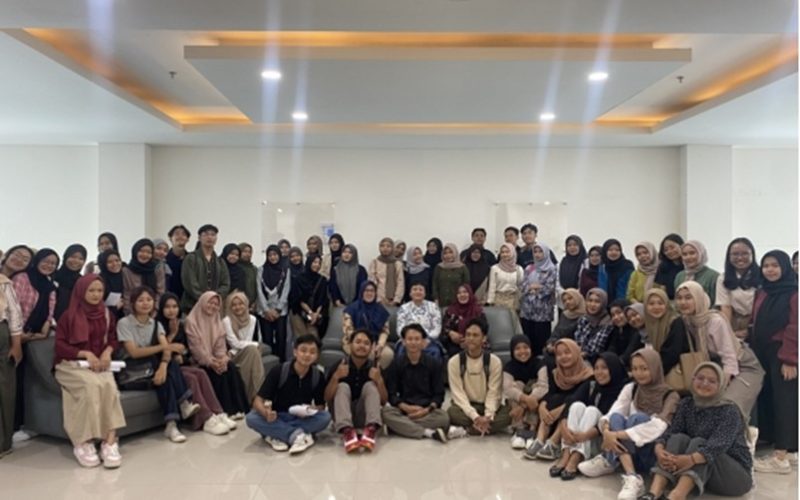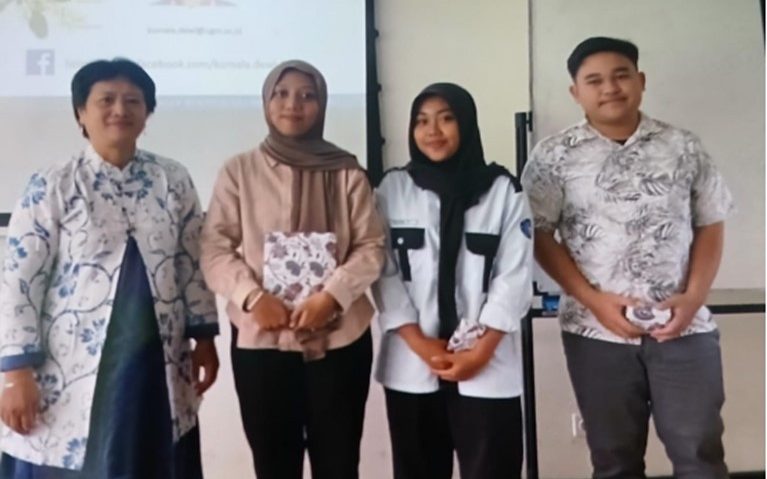Arsip:
SDG 2 : Erase Hunger
Yogyakarta, 31 July 2024 – The lecture series on the agenda of The 7th International Summer Course in Sustainable Development: Sustainable Bioprospecting of Tropical Biodiversity continues. The next lecture raised topics related to insect bioprospecting with speakers Sukirno, Ph.D., lecturer at the Entomology Laboratory, Faculty of Biology UGM, and Prof Said Ali El Salamouny, a professor in the field of entomology, especially insect viruses at Cairo University, Egypt. The lecture panel was moderated by a lecturer from the Animal Systematics Laboratory in the Parasitology section of the Faculty of Biology UGM, Dila Hening Windyaraini, S.Sc., M.Sc.
Mr. Kirno delivered his presentation regarding insect bioprospecting. On that occasion, he also brought processed insect products in the form of fried grasshoppers and fried cocoons. Both foods, which were less commonly heard of, were tried by the participants. Some of them admitted that the taste was similar to shrimp, saying that insects could be a source of protein, like marine crustaceans such as shrimp.
Continuing the presentation regarding insect bioprospection by Pak Kirno, Prof. Said then delivered his presentation on entomology, especially related to agriculture and plant protection in the Middle East, especially Egypt. He provided new understanding, especially the differences in agriculture in Egypt compared to tropical countries like Indonesia.
The Summer Course agenda continues with a mushroom cultivation workshop at JeJamuran, a restaurant in Jogja which is famous for its culinary delights from various types of mushrooms. The workshop location is in the JeJamuran agrotourism area, not far from the main restaurant. Participants were introduced to various types of mushrooms, how to cultivate them and learned about the right environmental conditions for mushroom growth. As souvenirs, workshop participants can also take-home mushroom planting media that they can grow themselves at home.
Through this series of summer course agendas, it is hoped that it can broaden the participants’ insight, especially regarding the potential for bioprospecting resources which are not limited to certain plants, but also things that are not commonly developed in bioprospecting studies such as insects and fungi.
On Wednesday, July 31, 2024, the Faculty of Biology UGM opened the series of the PIONIR Metamorphoself 2024, an annual event organized by the Faculty of Biology to welcome young biologists, as an introduction to the faculty and prepare them for their academic journey at UGM. The PIONIR Metamorphoself 2024 carried the theme ‘’Bioadaptability: Realizing a Generation of Pioneer Innovators for the Nation’’. Through this theme, it hoped that young biologists can excel and create in various fields of study, adapting to the transition from school to university.
The first day of PIONIR Metamorphoself began with the opening ceremony at 7:30 AM. The ceremony was opened with a welcome speech from the General Coordinator of PIONIR Metamorphoself 2024, Muhammad Syahrul Firdaus, followed by a speech from the Cluster Coordinator, Tyas Ikhsan Hikmawan, S.Si, M.Si, Ph.D.. Next, there was a speech from the Dean of the Faculty of Biology UGM, Prof. Dr. Budi Setiadi Daryono, M.Agr.Sc and officially opening the PIONIR Metamorphoself 2024, symbolized by the installation of a deer replica at Terra Nova. After the opening ceremony, young biologists attended several sessions.
The first session was a talk with the faculty leadership, Prof. Dr. Budi Setiadi Daryono, M.Agr.Sc., the Dean of the Faculty of Biology, Dr. Bambang Retnoaji, M.Sc, Vice Dean for Academic and Student Affairs, Dr. Slamet Widiyanto, M.Sc., Vice Dean for Finance, Assets, and Human Resources, and Dr. Eko Agus Suyono, M.App.Sc., Vice Dean for Research, Community Service, Cooperation, and Alumni Affairs. This session was moderated by Dr.rer.nat. Abdul Rahman Siregar, S.Si., M.Biotech, aimed to introduce young biologists to the organizational structure, facilities, and assets of the Faculty of Biology. The Vice Deans also explained academic and non-academic activities at the Faculty of Biology, collaborations with national and international institutions, and highlighted successful graduates in various fields.
Next was a session featuring Emi Dwi Suryanti, S.Si, M.Sc, Coordinator for Academic and Student Affairs, and Sukirno, S.Si., M.Sc., Ph.D., Head of the Bachelor in Biology Study Program, provided an overview of administrative systems, lectures, permissions, length of study, and exam requirements. Tips for young biologists to adapt to the Faculty of Biology at UGM were also shared, followed by a Q&A session.
After these sessions, young biologists participated in a quiz based on the materials presented during the leadership and academic coordinator talks. The next session was an introduction to the faculty lecturers, guided by MCs Angga Firza Pratama and Birrul Qisty Mutmainnah Nazara. The faculty lecturers were introduced in sequence according to their laboratories. Following the faculty lecturers introductions, young biologists participated in a bonding session with their Academic Supervisors (DPA). They directed to their DPA’s location based on a faculty map, guided by instructors. During this session, they received information about plagiarism and shared experiences about university life with their DPAs.
Yogyakarta, 20 July 2024 — The Faculty of Biology, Universitas Gadjah Mada (UGM) held the 8th National Seminar on Tropical Biology (SNBT) on 20 July 2024. This year, the seminar was held in a hybrid with “Biosecurity Innovation and Tropical Biodiversity Conservation” theme. This event, which was held at the Auditorium of the Faculty of Biology, aims to provide a platform for academics, researchers, practitioners and students to discuss current issues and innovative solutions in biosecurity and biodiversity conservation in tropical regions. This seminar activity began with a report from Dr. Siti Nurbaiti as chair of the 2024 SNBT Committee, followed by remarks by Prof. Dr. Mirwan Ushada, Director of Research representing the Rector of UGM and opened by Prof. Dr. Budi Setiadi Daryono. M.Agr.Sc., as Dean of the Faculty of Biology UGM. This seminar was attended by around 100 participants from 21 institutions in Indonesia. On this occasion, an MoU was also signed between the Faculty of Biology UGM and PT. Rentokil Indonesia. It is hoped that this collaboration can be a form of synergy between academics and industry, especially regarding the issue of biosecurity and Indonesian biodiversity.
As the first keynote speaker, Ir. Medrilzam from BAPPENAS raised the topic “The Role of Government Policy for Biodiversity Conservation”. In his presentation, Ir. Medrilzam delivered the Indonesian Biodiversity Strategy and Action Plan (IBSAP), the Indonesian government’s strategy for preserving biodiversity, and how these policies are expected to shape people’s behavior towards a positive nature.
As the second speaker, Drs. Heri Susanto from PT. Rentokil Indonesia discussed “The Role of Biological Science and Digital Technology in Sustainable and Environmentally Friendly Pest Control”. In this session, Drs. Heri Susanto conveyed the exploration of the integration of biological science with digital technology to develop pest control methods that are more effective and environmentally friendly.
The third speaker, Mrs. Rina Sri Kasiamdari, Ph.D. delivered material on “The Role of Fungi in Biosecurity and Biodiversity Conservation”. The focus of this discussion is the role of fungi as biosecurity agents in maintaining biodiversity, as well as how fungi can be used in conservation efforts.
The plenary session of the three speakers was enlivened with questions from seminar participants ranging from biodiversity protection related to infrastructure developments to opportunities for food source options with high nutrition from the variety of diversity that Indonesia has to meet food needs and in terms of handling. pest. The seminar activities were continued with parallel sessions filled with presentations by the participant speakers on various research titles, which were carried out offline and online.
The 8th SNBT in 2024 was closed by Dr. Eko Agus Suyono, M.App.Sc., as Vice Dean for Research, Community Service, Collaboration and Alumni Affairs. In his closing remarks, he said that SNBT is a forum for increasing understanding of biosecurity and tropical biodiversity conservation through in-depth discussions with experts in the field, thereby inspiring innovation and collaboration between academics, researchers and practitioners in efforts to protect biodiversity, encourage policy development and new strategies that can be implemented to preserve the environment and support the sustainability of tropical ecosystems. It is also hoped that this national seminar will create synergistic cooperation between the participants who attend, which is expected to be a positive thing that can build and provide more impact regarding issues related to the topic of biosecurity and tropical biodiversity conservation in the future. Furthermore, this seminar plays a role in implementing several points of Sustainable Development Goals (SDG’s): 2. Zero hunger, 3. Good health and well-being, 4. Quality education, 6. Access to clean water and sanitation, 7. Affordable and clean and energy, 9. Industry, innovation and infrastructure, 11. Sustainable cities and communities, 13. Climate change action, 14. Maintaining marine ecosystems, 15. Maintaining land ecosystems and 17. Partnerships for the goals.
Yogyakarta, 19 July 2024 – As part of the 2024 7th International Summer Course in Sustainable Development lecture series, the online lecture session continues after the previous lecture series on Wednesday (17/7) with researchers from Nottingham University. In this series, we present a microalgae expert from the Faculty of Biology, Universitas Gadjah Mada, Dr. Eko Agus Suyono, M.App.Sc. which carries the topic of microalgae biorefinery, in accordance with the theme promoted by ISC this year “Sustainable Bioprospecting of Tropical Biodiversity”.
Dr. Eng. Thoriq Teja Samudra, one of the lecturers at the Biotechnology Laboratory, Faculty of Biology, UGM, acted as moderator this time. He introduced Dr. Eko is one of the researchers in the same laboratory and also the inventor of various innovations related to microalgae. His research collaborates with various sectors and researchers from other fields such as chemical engineering.
Dr. Eko explained his presentation entitled “Microalgae Biorefinery: Integration Biorefinery and Biofuel”. The scarcity of fuel from petroleum over time has become one of the backgrounds for the development of microalgae biofuel. In addition, commonly used fossil fuels cause an increase in CO2 concentrations in the atmosphere, which is one of the triggers for climate change. Microalgae have great potential as biofuel, which is able to supply energy to produce biofuel while reducing CO2 levels in the atmosphere which is used in the photosynthesis process.
Apart from its potential as an alternative fuel, microalgae provide other bio prospective potential including cosmetics, potential food, and so on. Dr. Eko added that the extracted and purified algae biomass will produce various potential sustainable products: food, biodiesel, fertilizer, animal feed, chemicals and so on. This makes a major contribution to various sectors ranging from food security, health, energy, to tackling climate change.
The summer course participants were enthusiastic in attending all the lectures, it is hoped that through these activities students can contribute to innovation in the development of sustainable research products while maintaining the balance of the ecosystem and biodiversity within it.
Manila, Philippines – The Faculty of Biology at Universitas Gadjah Mada (UGM) participated in the Asian Science Deans Forum 2024 (ASDF 2024), held from July 8 to 12, 2024, at the Crimson Hotel, Filinvest City Manila, Philippines. The UGM delegation, led by Prof. Dr. Budi Setiadi Daryono, Dean, and Dr. Bambang Retnoaji, Vice Dean for Academic and Student Affairs, joined esteemed faculty members from science and technology universities, schools, colleges, and academic departments across Asia. This initiative aimed to foster partnerships among Asian universities, create research projects, and contribute solutions to societal problems, focusing on environmental sustainability and socio-economic development.
One of the key topics at ASDF 2024 was the environment, particularly ecosystem protection and the efficient use of resources. The Faculty of Biology at UGM is particularly interested in these areas, as they align with their ongoing research and educational initiatives aimed at promoting sustainability.
The UGM delegation shared their experiences and strategies in integrating sustainability into their curriculum, which aligns with the global Sustainable Development Goals (SDGs) and emphasizes the importance of preparing future generations to tackle environmental challenges.
The forum also opened up networking opportunities, fostering the mobility of researchers, professors, and students, creating new cooperation across Asia, and enhancing the academic and research capabilities of the participating institutions. Consequently, the UGM delegation was able to expand their international collaborations.
ASDF 2024 featured a series of workshops, panel discussions, and keynote speeches from leading experts in various fields, providing valuable insights and practical knowledge that can be applied to address pressing environmental and socio-economi.
The event also highlighted the importance of global partnerships in achieving sustainable development. By working together, universities across Asia can pool their resources and expertise to make a significant impact on the environment and society.
The participation of the Faculty of Biology at UGM in ASDF 2024 underscores their commitment to advancing environmental sustainability and education for sustainability. By engaging with peers from across Asia, they hope to gain new perspectives and insights that will enhance their efforts in these areas.
The Faculty of Biology was also initiating a collaboration with Sultan Qaboos University, Oman, during ASDF 2024. This significant partnership aims to foster scientific research and academic excellence for both parties. Dr. Talal Khalifa Al Hosni, Dean of Sultan Qaboos University, Oman, plays a pivotal role in this collaboration.
Manila, Philippines – On Thursday, July 11, 2024, a significant meeting took place at The Manila Hotel, marking a new chapter in educational and research collaboration between the Faculty of Biology, Universitas Gadjah Mada (UGM), and the Southeast Asian Regional Center for Graduate Study and Research in Agriculture (SEARCA). The UGM delegation, led by Prof. Dr. Budi Setiadi Daryono, Dean, and Dr. Bambang Retnoaji, Vice Dean for Academic and Student Affairs, officially met with SEARCA’s delegation, headed by Center Director Dr. Glenn Gregorio.
The primary agenda of the meeting was to discuss the possibility of a partnership aimed at advancing educational and research opportunities, contributing to the development of sustainable biodiversity management and agricultural practices in the region. This collaboration is expected to play a crucial role in addressing key Sustainable Development Goals (SDGs) such as ending poverty (#endpoverty), ensuring food security (#foodsecurity), and providing access to quality education (#accesstoeducation).
One of the key outcomes of the meeting was the initiation of a joint scholarship program. This program will include academic exchanges, double degree programs, and joint research projects, particularly targeting students from ASEAN countries. The scholarship aims to provide students with the opportunity to gain international experience and knowledge, thereby enhancing their academic and professional capabilities.
Prof. Dr. Budi Setiadi Daryono emphasized the importance of this collaboration in fostering a new generation of scientists and researchers who are well-equipped to tackle regional and global challenges. “This partnership with SEARCA is a significant step towards achieving our shared goals of sustainable development and educational excellence,” he stated.
Dr. Glenn Gregorio, on behalf of SEARCA, expressed his enthusiasm for the collaboration. “We are excited to work with UGM in creating opportunities for students and researchers. This partnership will not only benefit the academic community but also contribute to the broader goals of sustainable agriculture and biodiversity management in Southeast Asia,” he said.
In addition to the scholarship discussions, Prof. Dr. Daryono extended an invitation to SEARCA to participate in UGM’s prestigious annual International Conference on Biological Sciences and the Summer Course on Sustainable Tropical Agriculture. These events provide platforms for scholars, researchers, and practitioners to share knowledge and advancements in their respective fields.
The meeting concluded with both parties expressing their commitment to formalizing the partnership and exploring further avenues for collaboration. The joint scholarship program is expected to be launched in the upcoming academic year, with detailed guidelines and application processes to be announced soon.
This initiative is seen as a significant milestone in the efforts to enhance educational and research capacities in the region. By providing students with access to quality education and research opportunities, UGM and SEARCA are contributing to the broader goals of sustainable development and regional cooperation.
The collaboration between UGM and SEARCA is a testament to the power of partnerships in achieving common goals. As both institutions move forward with this initiative, they are setting a precedent for other universities and research centers in the region to follow.
The joint scholarship program and the associated academic events are expected to attract a diverse group of participants, fostering a rich exchange of ideas and innovations. This, in turn, will contribute to the development of sustainable solutions for some of the most pressing challenges facing the region today.
Yogyakarta, July 1, 2024 – Two lecturers from the Faculty of Biology Universitas Gadjah Mada (UGM) participated in advanced training on the Next Generation Sequencing (NGS) platform organized by Genomic Solidaritas Indonesia (GSI). This three-day training covered theoretical and practical aspects of using the Oxford Nanopore Technologies (ONT) platform. Participating in this training is a part of the commitment to advancing bioinformatics research in Indonesia. The implementation of High-Performance Computing (HPC) to process large biological datasets aligns with UGM’s research goals, and this training equips researchers with the necessary skills to effectively utilize these advanced tools.
Day 1: Introduction to ONT Platform and Basic Bioinformatics
The first day of the training consisted of theory and practical sessions. The theory session introduced participants to the ONT platform, the latest NGS technology that uses electrical current through nanopore proteins. There was also a demonstration of using the minKNOW software for ONT and EPI2ME LABs for post-NGS data processing. The practical session introduced basic bioinformatics programming using bash, including file systems, post-NGS data reading, file management, software management using Mamba, and de novo alignment techniques.
Day 2: Advanced ONT Features and Data Processing
The second day continued with the theory session on the advantages of ONT over other platforms, particularly the Adaptive Sampling concept, which makes ONT flow cells more efficient and the data obtained more specific. The practical session included assembly, variant calling, annotation, and an introduction to Biopython, a Python package for bioinformatics data processing. The second day training concluded with a lab visit to observe the sequencing infrastructure at GSI Lab.
Day 3: Metagenomic Analysis and Final Project
The final day focused on practical sessions and the final project. Participants learned about 16s Metagenomic Analysis using EPI2ME Labs through the Command Line Interface (CLI). The training concluded with a final project, where participants processed ONT fastq (.fastq) files into bam (.bam) files for further analysis using R Studio or Python.
Importance of NGS Analysis in Supporting Biosecurity Topics to Achieve Food Security
Advancements in NGS tools have significantly enhanced research in life sciences, allowing for more specific and in-depth studies. Understanding the genetic material of organisms is crucial for comprehending their activities and life processes. This is evident in the rapid progress of precision medicine, which reveals individual uniqueness through genetic analysis.
In the PUAPT research program, the Faculty of Biology UGM has mandated biosecurity in land and water management within the Food Security working group. These tools are invaluable for studying the rhizosphere microbiome community, microbe-plant interactions, the impact of microbiomes on fertilizer and pesticide usage, and gene expression differences in food crops under specific land and water management treatments. NGS analysis plays a crucial role in supporting these efforts to achieve sustainable food security, in line with the Sustainable Development Goals (SDGs), particularly SDGs No.2 of zero hunger, achieving food security and improved nutrition, and SDGs No.13 related to combating climate change to support sustainable agriculture.
Joglo Donowarih, Sidokarto, Godean, Sleman, Special Region of Yogyakarta – On Friday, June 28, 2024, the DIY Regional Library and Archives Office hosted a book review titled “Smart Waste Management with Community” in Sidokarto, Godean. The event drew 120 participants from 7 villages in the Godean sub-district interested in becoming catalysts for waste banks and adopting zero waste practices.
The event was prompted by the closure of the Piyungan Landfill, which led to increased community incineration of waste, heightened air pollution, and potential health risks. In response, the DIY Regional Library and Archives Office organized a book discussion led by Mr. Ir. Twaistrisna Hepiprana S.Pt., M.M., IPM., with opening remarks by Mr. Rakhmat Sutopo, S.E., Head of Static Archive Management at the Regional Library and Archives Office, and a speech by Mr. Sofyan Sertyo Darmawan, ST., M.Eng., a member of the DIY Provincial DPRD.
The book “Smart Waste Management with Community,” authored by Esaputri Purwandari, Yomi Windri Asni, Umdatul Qori’ah, and Muzna Nurhayati, was presented by Mrs. Novita Yustinadiar, S.Si., M.Si., a lecturer from the Laboratory of Plant Structure and Development, Faculty of Biology UGM. It discusses practical waste management approaches based on the experiences of the GEMI cooperative. The discussion highlighted the book’s relevance, clarity, and direct applicability, showcasing successful waste bank initiatives and their effective strategies. The presenter emphasized key points, integrating biological insights, experiences from Japan’s zero waste initiatives, and practical experiences in organic and non-organic waste processing during Community Service in Dusun Sendari.
The discussion continued with a presentation by Mrs. Esaputri Purwandari, S.E., CFP., one of the book’s authors, who shared practical experiences in composting using various accessible methods such as pottery composters, stacked bucket composters, and managing inorganic waste through waste banks, as well as soap-making from used cooking oil to add economic value to waste and enhance community livelihoods.
Interactive discussions during the book event allowed participants to share their experiences and challenges in waste management. Community members expressed keen interest in learning about composting, recycling, and reducing single-use plastics. The discussion underscored the importance of basic environmental literacy and the application of the 5R principles: Refuse (rejecting single-use items), Reduce (minimizing single-use consumption), Reuse (reusing products), Recycle (processing recyclables), and Rot (composting organic waste) to tackle waste issues. It also highlighted three harmful waste practices to avoid: burning waste, burying plastics and metals, and dumping waste into the sea. These practices remain prevalent in the DIY community, necessitating heightened awareness campaigns about their environmental and legal repercussions as stipulated in Law Number 18 of 2008 on Waste Management, which prohibits improper waste burning and carries penalties of imprisonment or fines.
The event aimed to boost community literacy and awareness of sustainable waste management practices. The DIY Regional Library and Archives Office distributed the book for free as an initial step toward achieving these objectives. Similar successful events have been held in various sub-districts across DIY, contributing to broader efforts to disseminate knowledge and skills in effective waste management. The event aligns with Sustainable Development Goals (SDGs) 2 (Environmental Sustainability), 3 (Air Pollution), 4 (Basic Literacy), and 5 (Empower Girls), focusing on education for sustainability and community empowerment.
[PkM – MBKM] On Saturday, May 18, 2024, The Community Service Independent Learning Independent Campus (PkM-MBKM) team, guided by Prof. Dr. Kumala Dewi, M.Sc.St., conducted an educational event on Antioxidant-Rich Food Crops in Blotan Village, Wedomartani, Sleman. The event was attended by 15 representatives from the PKK group and participated by four students from the Faculty of Biology, namely Cika Aprilia Hendriana, Wafiq Nur Azzizah, Nayla Rasya Nareswari, and Della Thasya L.S.. The event aimed to increase public knowledge about the importance of antioxidant-rich food crops for health.
The event was led by Prof. Dr. Kumala Dewi, M.Sc.St., a plant physiology expert from the Faculty of Biology UGM. She explained in detail about antioxidants and their ability to protect body cells from free radicals, which can cause various diseases such as heart disease, Alzheimer, and Parkinson. In her presentation, Prof. Dr. Kumala Dewi, M.Sc.St., discussed several antioxidant-rich food crops, including colorful fruits and vegetables like purple sweet potatoes, strawberries, purple cabbage, and kale leaves. Many of the participants were unaware that kale is known as a superfood due to its rich nutritional content. It reported that 70 grams of raw kale leaves contain about 33 calories and various essential nutrients, including carbohydrates, fiber, protein, vitamins K, A, and C, and minerals such as calcium, potassium, magnesium, zinc, iron, and phosphorus. Kale also contains omega-3 fatty acids, manganese, thiamin (vitamin B1), riboflavin (vitamin B2), niacin (vitamin B3), and various antioxidants, such as beta carotene, flavonoids, and polyphenols. Notably, kale contains high levels of the unique flavonoids quercetin and kaempferol. These nutrients help maintain overall health, including heart health, eye health, diabetes prevention, and cancer management. In the following program, there will be a demonstration of kale cultivation in Blotan Village.
At the end of the presentation, a discussion session was held on the importance of nutritious food to prevent stunting in children. The event also included a hands-on practice of making fruit and vegetable salads rich in antioxidants. This session aimed to allow participants to experience antioxidant-rich fruits and vegetables and to understand how to make simple antioxidant-rich salads quickly and easily.
This activity is part of the 2024 PkM-MBKM Program of the Faculty of Biology UGM, titled “Education and Sustainable Cultivation Practices of Food Crops and Fisheries through Urban Agriculture in Blotan Village, Wedomartani, Sleman, Yogyakarta.” This community service activity supports the Sustainable Development Goals (SDGs), particularly Pillar 2 (zero hunger) and Pillar 12 (responsible consumption and production). It hoped that this activity will continue to improve the quality of life for the community and support SDG pillar 3 (good health and well-being) for all.
One of the lecturers from the Faculty of Biology, Universitas Gadjah Mada, Prof. Dr. Kumala Dewi MSc.St has given a guest lecture at the practitioner activity for the Growth Regulatory Substances course, at the Faculty of Agriculture, Universitas Tidar, Magelang, on Friday 19 April 2024. The general lecture topic is “The Role of Phytohormones in Regulating Plant Growth, Development and Adaptation to Global Climate Change”. In this lecture, Dr. Tri Suwarni Wahyudiningsih, S.Si.,
M.Si. as Vice Dean for General Affairs and Finance, Faculty of Agriculture, Tidar University and instructor of the Growth Regulatory Substances course. Apart from that, there were also members of the team teaching for the Growth Regulatory Substances course, Muzayyanah Rahmiyah S.P., M.Sc. There are 50 students who attend lectures directly in class and 100 other students attend lectures via the links provided online.
Explained by Prof. Dr, Kumala Dewi MSc.St as a resource person about various plant hormones, the function of each hormone and the mechanism of action of hormones in the process of growth, development and resistance of plants to various stresses, both biotic and abiotic. Regarding efforts to mitigate global climate change which results in impacts on agriculture such as increasing the intensity of sunlight, reducing the availability of ground water, the emergence of pests and plant diseases which can disrupt the growth, development and yield of food crops, it is stated that by understanding the work of hormones, efforts can be made for plants that can tolerate various stresses. For example, rice plants that accumulate cytokines can produce more grain due to changes in panicle architecture and an increase in the ability of the grain (in this case the grain) to obtain photosynthetic. In addition, tobacco plants that are able to produce more cytokines are more drought tolerant because they delay leaf senescence.
Students who took part in the lecture were quite enthusiastic in asking several questions during the presentation of the material. Apart from that, there were several quiz questions given to students and students who answered correctly received prizes/mementos from the presenters. At the end of the lecture, one of the student representatives also expressed his thanks for receiving the lecture material on phytohormones and growth regulators. Thanks were also conveyed by Dr. Tri Suwarni Wahyudiningsih, S.Si., M.Si. regarding the lecture material that has been presented. Apart from that, through this lecture it is hoped that students will gain a more detailed understanding of plant hormones and the methods that can be applied to modify plant growth and development. It is hoped that this knowledge about phytohormones and growth regulators can be applied in an effort to obtain plants that are tolerant to various stresses due to global climate change. The presentation of lecture material on phytohormones and growth regulators also supports two of the 17 SDGs (Sustainable Development Goals), namely Zero hunger (Goal 2) and Climate Action (Goal 13). The lecture session ended with a group photo between the speakers, namely Prof, Dr. Kumala Dewi MSc.St., lecturer in the Growth Regulatory Substances course at the Faculty of Agriculture, Tidar University, namely Dr. Tri Suwarni Wahyudiningsih, S.Si., M.Si. and Muzayyanah Rahmiyah S.P., M.Sc. as well as all students who take this course.


